SEO (Search Engine Optimization) and Data Analysis

Friendly URLs
The functionality of friendly URLs for pages is similar to that of channels (First, check the configuration of channel friendly URL). It is also necessary to enable it to "yes" when not inheriting this configuration from the "parent" channel.
- Enable: Allows you to determine whether the friendly URL property will be enabled for the page if inheritance is not enabled (and the channel has the property enabled to yes). It also allows, in a structure of "parent" channels with friendly URL configured, to set a specific page to not have a friendly URL by configuring it to no. Thus, the dynamic or static path (if the page is in cache) will be displayed. Finally, it can simply inherit what is configured for the parent channel;
- Format: It is possible, through this property, to determine another format for the friendly URL if the page is inheriting the friendly URL from the parent channel.
- Delete and recalculate friendly URLs: Deletes all Web Resources related to the page.
To exemplify, consider the scenario 6 of the explanation of friendly URL of the channel:
For the page "Basketball" to not display the friendly URL http://domain:port/context/ sports-8A488AE35700E831015700E959450061.htm , for example, but rather http://domain:port/context/ sport_basketball.htm it is necessary to override the format of the channel, as exemplified in the figure below:

Meta-Tags
As seen in the properties of a channel, the pages belonging to it can inherit their meta-tags (if inheritance is enabled). In addition to the inherited meta-tags, others can be added.
- Description: Description of the page to facilitate its management. The assembler uses this value to build the meta-tag description to be displayed in the header of the HTML page and used by external search engines;
- Title: Title of the page that will be displayed in the browser's title bar. This value corresponds to the tag <title> of the header of the HTML to be used by external search engines. When not filled in, the assembler will use the value provided in the Name;
- Keywords: Words that define or are part of the content of the page. These words will be used by Internet search engines to find and list the site in their results. They should be separated by commas;
Regarding the display of data for the meta-tags, you can inherit the configuration from the parent channel or use the other types already explained in the meta-tags section of the channel.
Data Analysis
This option allows you to configure whether the portal's Javascript monitoring API should be automatically included in the HTML of the page. By default, its value is Inherit configuration If the accessed page and all its ancestor channels have the value Inherit configuration, the assumed value will be No.
Valid Options:
- Inherit configuration: This current page will inherit the configuration of its parent channel;
- Yes: The Javascript monitoring API code will be included in this page;
- No: The Javascript monitoring API code will not be included in this page.